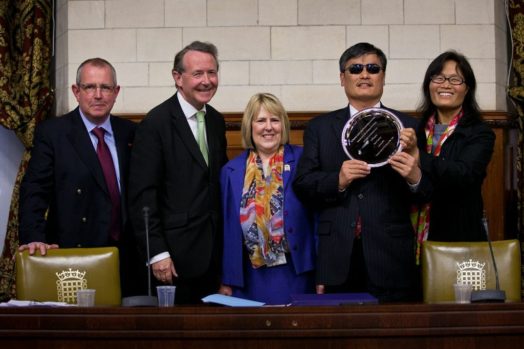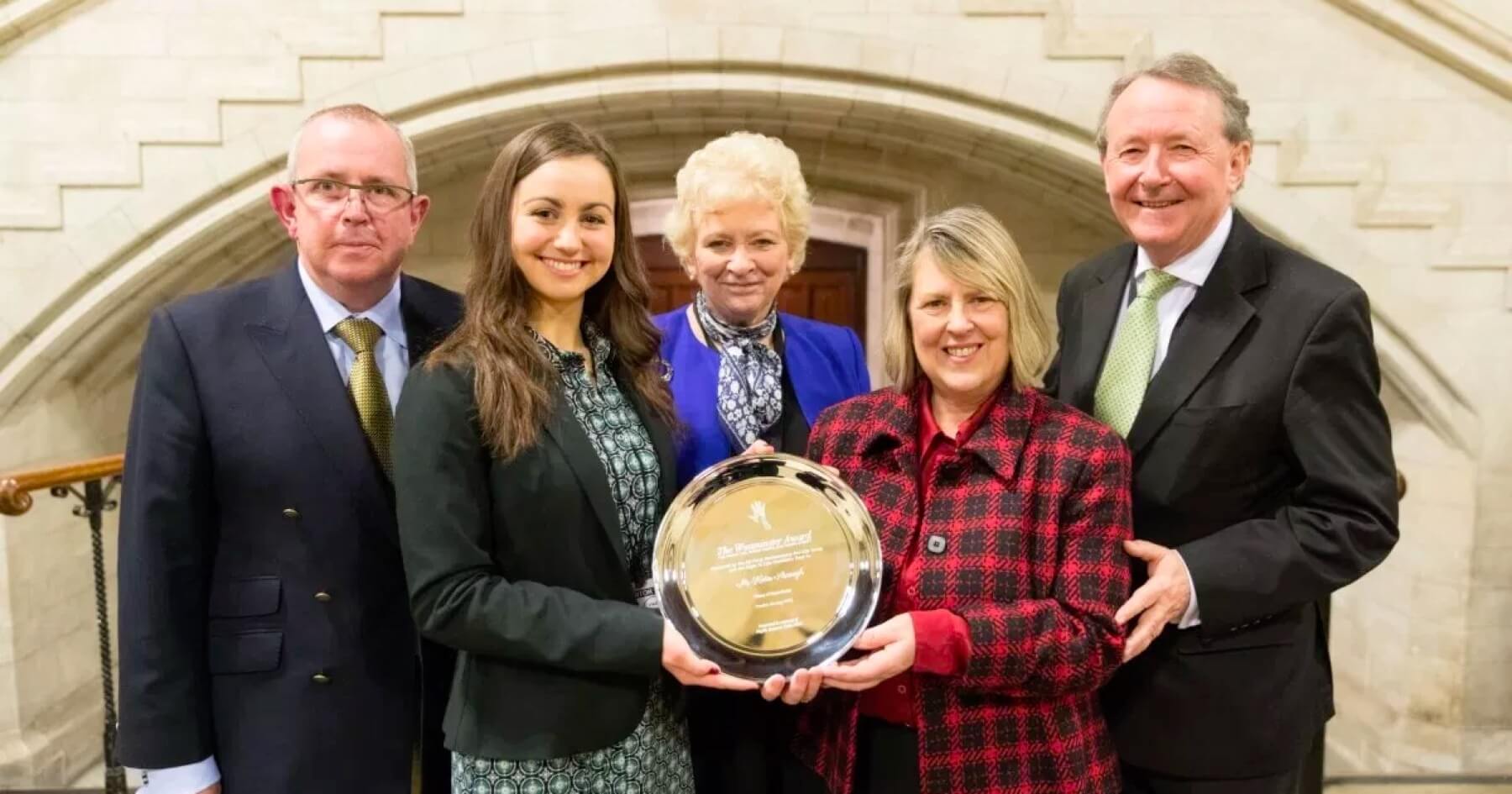“The Westminster Award for Human Life, Human Rights, and Human Dignity, recognises extraordinary and notable work and achievements that safeguard the dignity and right to life of human beings.
The Westminster Award was founded in 2013, a year after the death of Right To Life founder Phyllis Bowman DSG, in whose memory it is awarded.
The recipient of the Westminster Award is chosen by the Chair of the All-Party Parliamentary Pro-Life Group and the Trustees of Right To Life, having taken advice from senior MPs and Peers in both Houses of the Westminster Parliament.
Lord Alton of Liverpool (2021)

Human rights campaigner and Member of the House of Lords, David Alton, received the 2021 Westminster Award for Human Life, Human Rights, and Human Dignity.
Lord Alton was elected as Member of Parliament in 1979, and has sat as a crossbench member of the House of Lords since 1997.
Author of eleven books, he is a Visiting Professor at Liverpool Hope University, serves on the House of Lords International Relations and Defence Select Committee, is Co-Chair or Vice Chair of eight All-Party Parliamentary Groups, and is Trustee or Patron of a number of charities and voluntary organisations.
Lord Alton is a senior member of the All-Party Parliamentary Pro-Life Group and a patron of Right To Life UK.
A champion for justice and life
Lord Alton began his career as a teacher, working in socially disadvantaged neighbourhoods, teaching immigrant children, and later children with special needs.
He became involved in politics as a teenager and at 17 years of age was elected as chairman of his town’s branch of Young Liberals. In his Student Union he successfully proposed a campaign against apartheid and became active in community politics, choosing to live in a neighbourhood where half the homes had no inside sanitation and had been designated as a slum clearance area. In 1972, while still a 21-year-old student, he was elected to Liverpool City Council for the Low Hill (and Smithdown from 1973) Ward and became the city’s Housing Chairman and Deputy Leader. At the time of his election, he was Britain’s youngest city councillor.
He was elected as Member of Parliament for Liverpool Edge Hill at a by-election in 1979 for the former Liberal Party, becoming the “Baby of the House” – the youngest member – achieving a record swing of 36.8% and 64% of the vote.
He won the seat the day after the Callaghan Government was defeated in a vote of confidence and the 1979 General Election being called. He became the shortest-lived MP, a Member for less than a week, and made his Maiden Speech within three hours of taking his seat. Five weeks later he was re-elected and went on to serve as a Liverpool MP for 18 years, before standing down in 1997. He was the only new member of a Parliamentary Party of 11 MPs. He campaigned on the slogan “Everyone Knows Someone Who Has Been Helped by David Alton.”
He was his Party’s spokesman on Home Affairs, Northern Ireland, Overseas Development and the Environment, and served as Chief Whip, Chairman of the Party’s Policy Committee and national President of the National League of Young Liberals.
In 1987, he resigned as Chief Whip to campaign for his unsuccessful Private Member’s Bill which aimed to stop late abortions. The Bill achieved a record 296 votes and a majority of 45 in the House of Commons – and never lost a vote at any stage – but was filibustered by opponents.
In 1992, after his Party moved from a “conscience” position on abortion to making the issue a matter of party policy (on the same day on which a motion was passed calling, among other things, for protection of goldfish sold in amusement arcades and funfairs) he announced that he would not contest again on the party’s platform.
In 1997, he stood down from the House of Commons, and from party politics, and was nominated by the Prime Minister, Sir John Major, to the House of Lords.
He has introduced Private Member’s Bills in Parliament on the rights of private tenants; minimum housing standards; victims of violent crime; the upper time limit for abortion; the right to establish housing co-operatives; the right to establish directly elected neighbourhood councils; the re-export of arms; a Bill to require research into the causes and cures for mesothelioma; and a Bill to create new mechanisms to bring to justice those responsible for genocide or crimes against humanity.
Lord Alton is founder and co-chairman of the British-DPRK All-Party Parliamentary Group, and visited Pyongyang on four occasions, including in October 2010 when he had talks with leaders of the North Korean government including Choe Thae Bok, chairman of the Supreme People’s Assembly, the country’s rubber-stamp parliament and when he protested about human rights violations in that country, raising specific cases with their Ministers. He details his experiences in his book, written with Rob Chidley, ”Building Bridges: Is There Hope For North Korea?” (Lion 2013), one of eleven books he has authored.
In March 2017, as a member of the Sages Group (to which he was appointed in 2016), he spoke at a forum of the 34th Session of the UN Human Rights Council, alongside His Honour Judge Michael Kirby (chairman of the UN Commission of Inquiry into North Korea) and Dr Marzuki Darusman, former UN Special Rapporteur on North Korea, and called for the regime’s leaders to be prosecuted by the International Criminal Court.
He also successfully campaigned for the creation of BBC World Service broadcasts to the Korean Peninsula.
In 2020, he was appointed to the House of Lords International Relations and Defence Select Committee – and involved in the Committee’s reports on Sub Saharan Africa and Afghanistan. In 2021, the Committee agreed to a new Inquiry into China, Trade and Security.
During lockdown, he hosted several webinars and participated in conferences on issues such as the abduction, forced marriage and forced conversion of girls and women, on Article 18 of the Universal Declaration of Human Rights, and on the failure to respond to mass atrocities in Nigeria and Burma.
In 2020 he moved amendments to Telecommunications and Trade legislation challenging the links between Huawei, the Chinese Communist Party and the use of Uyghur slave labour, and in 2021 he promoted the All-Party Genocide Amendment to the Trade Bill.
Chris Whitehouse KCSG, a trustee of Right To Life UK, said:
“His career has, and continues to, embody the tireless championing of Human Life, Human Rights, and Human Dignity that the Westminster Award was launched to acknowledge. The work of Right to Life UK would simply not be possible without the encouragement and expertise Lord Alton has contributed to our mission, and so many other just causes, throughout his lifelong advocacy on behalf of the most vulnerable. Throughout his time in Parliament, Lord Alton has relentlessly championed the cause of the unborn and women facing crisis pregnancies. Lord Alton continues to work tirelessly to promote the pro-life cause in Parliament. Right To Life UK’s Westminster team have the honour of being able to work directly with Lord Alton on a regular basis. He is the key driver of pro-life activity in the House of Lords, inspiring a large group of Peers to join him on championing the rights of the vulnerable on this vitally important issue. He is a role model and mentor to the next generation of pro-life MPs not only at Westminster but also to young pro-life Parliamentarians around the world. Thank you, Lord Alton, for 41 years of service, tirelessly championing a better world for the next generation, both born and unborn. Here’s to another 41!”
Katie Ascough (2018)

The 2018 recipient of the Westminster Award was Katie Ascough, formerly President of the University College Dublin Students Union (UCDSU).
Elected as USCSU President in March last year on a platform to improve issues like student mental health and accommodation, Ascough was attacked from the beginning of her candidacy for her pro-life beliefs, which she had held strongly since her mother miscarried when Ascough was 15 years old, and she had held the 13-week-old body of her sibling. This eye-opening encounter made Ascough feel compelled to protect all human life, and in 2016 she campaigned against the renewal of UCDSU’s official position in favour of repealing the Irish Constitution’s Eighth Amendment, which guarantees the right to life of unborn children.
Threats to impeach Ascough for her right-to-life convictions went back to her Election, but became a reality when she had a page containing information on abortion access removed from the UCDSU Fresher’s magazine, Winging It, after receiving legal advice that it may have been illegal. As CEO of the Union, Ascough would have been legally responsible, and potentially risked a criminal record.
Other Sabbatical officers disagreed with Ascough, and a campaign for her impeachment was started. In October last year, a vote on her removal saw 6,572 out of the over 30,000 UCD students vote. Of these, 4,540 voted to impeach Ascough, whilst 2,032 voted against removing her as head of the Union.
In her speech after the vote, Ascough said:
“This is a sad day for me, but it is also a sad day for our university” University should a place of freedom of speech, freedom of thought, and freedom of association. Fairness, respect for those who don’t wish to break the law, and respect for others with different beliefs, are critical to debate and intellectual freedom on campus. While I am deeply saddened at the outcome of today’s vote, and that so many students would impeach me, and find me guilty of breaking the law, I hope we can build an atmosphere of fairness, of conversation and of openness, to people who might not fit the stereotypical SU President image”.
Since her impeachment, Ascough has spoken in favour of freedom to speak and to associate on campus for those with views that do not reflect the Student Union orthodoxy, such as right-to-lifers, becoming a symbol of the difficulties and determination of the student right-to-life movement. Ascough has also signalled her intention to campaign in favour of Ireland retaining the Eighth Amendment.
Right To Life will be giving her the Westminster Award for her integrity, courage, and public witness in favour of the open society, and the equality and right to life of unborn children.
Magnus MacFarlane-Barrow, OBE (2017)

The second recipient of the Westminster Award was Scottish charity leader Magnus MacFarlane-Barrow, and the Award Ceremony took place in February of that year at the Palace of Westminster. You can view pictures of this occasion on the RTL Flickr account, here.
With his brother Fergus, MacFarlane-Barrow started efforts in 1992 during the conflict in the Balkans after the breakup of the state of Yugoslavia. The two brothers were both fish-farmers in their mid-to-late-twenties when, touched by the plight of those affected by the conflict, they began a local appeal for food and blankets. They then drove to Bosnia with a jeep filled with the cargo they received and kept in their parents’ shed, and delivered it to those in need.
When they returned, they found that more donations had come in, and so Magnus took a year out from his job to continue delivering the aid. The donations never stopped however, and so Magnus took on his project full time, turning it into a charity initially named ‘Scottish International Relief’ and recently renamed ‘Mary’s Meals’.
In the 25 years that the charity will have been going by the end of 2017, it has become a school feeding charity, working with some of the world’s poorest communities to set up school feeding programmes, which enable children to come to school and gain an education that can offer a route out of poverty. In 2015, the number of children served by Mary’s Meals reached the milestone of 1,000,000.
Fiona Bruce MP, Chair of the All-Party Parliamentary Pro-Life Group and a Patron of Right To Life, said that:
“Magnus MacFarlane-Barrow exemplifies what the Westminster Award aims to celebrate: the valuing and active safeguarding of human life. By his efforts, and those of Mary’s Meals, many people have been delivered from hunger and malnutrition. The basic right of every human person to the essential elements of life, is part-and-parcel of their right to life itself, and fundamental in respecting their human dignity”.
Chen Guangcheng (2013)

The first recipient was the blind Chinese human rights lawyer and campaigner Chen Guangcheng, for his heroic work defending the rights of women and children who were being victimised by the implementation of the Government of China’s population control policies.
Chen, a lawyer from northeast China who overcame his sight impairment to teach himself law, became an icon of human rights activism against the Chinese Government when in 2005, seeing the brutal abuse of women and children by the implementation of the One Child policy, he brought a groundbreaking lawsuit in 2005 against its illegal enforcement in the Shandong province.
State officials retaliated by kidnapping him and sentencing him to over four years in prison. Even after he was released, he was kept under house arrest with his wife and two children who with him were subjected to beatings and forbidden outside contact. In 2012, Chen managed to escape by feigning illness and climbing over the wall surrounding his house at night.
Despite not being able to see, he travelled over countryside, and with the help of fellow human rights activists was able to make it to the U.S. Embassy. After a month of negotiation, he was allowed to travel to America, where he has since continued to advocate for human rights and the rule of law to be respected in China.

